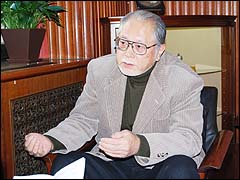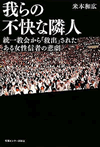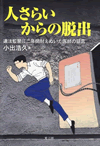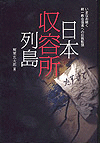News
Cycle of Kidnapping and Confinement (Part VI) Interview with Religious Journalist, Mr. Tadashi Murou (First Part)
Cycle of Kidnapping and Confinement (Part VI)
Interview with Religious Journalist, Mr. Tadashi Murou (First Part)

Court leadership that distracted the real cause
In the Series 'Cycle of Kidnapping and Confinement' (Part VI) published last December, we disclosed the court proceedings' records regarding the accused who was charged with alleged violation of the Anti-Stalking Act after he looked for his fiancee who had abruptly lost contacts with him shortly before their planned marriage. (The Tokyo District Court put him on probation on December 27th.) We interviewed Mr. Tadashi Murou, religious journalist, for his comments on the judgment and the Part VI series. (Interviewed by: Kazuhiro Horimoto, Haruhiko Katagami)
Forced de-conversion hardly acknowledged / Court proceedings questioned by some media
- Part VI in the Series filed the court observation in the case allegedly violating the Anti-Stalking Act but apparently involving the religious kidnapping issue. What is your comment on the trial?
"My first, rather pessimistic intuition over the court case has proved right. Your series wrote precisely the field reports and insights into the case. But you could pursue more vehemently over the prosecution's intent of avoiding the subject of kidnapping and confinement in the proceedings as well as the court leadership by the Judge Toshihiro Fukushi who virtually followed the prosecution's line of arguments.
Since you never knew how trial would be headed, you must have faced difficult editorial management. In that sense, the latest Series was fairly as reasonable as the previous ones."
- How do you evaluate the position of the Judge?
"I guess the very peculiar viewpoints, behind such cases in the Japanese society, have not altered since 50 years before. Though this incident basically could not be dissociated with the deprogramming problem (forced de-conversion), both the prosecution and the court avoided that essential issue altogether and concluded the case with a virtually premeditated decision.
The viewpoints in Japanese courts, especially concerning the deprogramming issue, have not progressed, or rather reversed backward."
- I heard that the judge mentioned on this Stalker Case like: "There seem to be complicated circumstances" in his informal discussion with lawyers and prosecutors. Contrary to our expectation, the court proceedings did not touch upon anything like that.
Judge Fukushi apparently expressed his true mind in his utterances like "I heard about an association with deprogramming" or "I sense it!" If the defense could push it at that stage, he might not take that kind of one-sided court leadership."
- Mr. Murou, you have pointed out what could put an end to the religious kidnapping and confinement is partly depending on attitude or judgment of the judiciary. Based on the decision at the First Instance, how do you assess their judgment?
"It looked fairly difficult.
In America, the deprogramming practice was eliminated only after the judiciary concluded it illegal. Those who promote the religious kidnapping and confinement in Japan base their position on the fact that the police and judiciary would not interfere in the kidnapping and confinement matters and they are critical on the Unification Church in general. The pro-confinement people base their tactics and activities on those facts.
Their arguments are adopted by mass media, followed by the society at large. As what was pointed out by Shichihei YAMAMOTO, as referred to in your series No.172, the key lies in the judiciary, but the situation is formidable yet.
But quite a few individuals engaged in media professions confided their doubts by saying: "It looked strange!" or "It was not like a normal court case, a kind of being staged deliberately". The court leadership is also questioned by some media professionals."
- Quite a challenging situation, isn't it?
"The judiciary covers both civil and criminal affairs. In the civil affairs, complaints are automatically received, various arguments are exchanged in courts, and numerous precedents and their circumstances are stockpiled. But their judgments have not drastically altered in the civil cases, while their general atmosphere and directions are gradually changing.
Besides, there are much fewer cases on which the pro-confinement group can file complaints on one hand, while victims of confinement like Mr. Toru GOTO are filing more lawsuits, on the other. In a historical perspective, something is moving differently in the civil affairs.
Changing atmosphere in civil affairs? / abusing the existing court system
As for criminal affairs, the Unification Church members can hardly file complaints as plaintiffs, as their pursuit is firmly blocked by the police and prosecutors. On the contrary, cases where the Unification Church or its members are to be indicted can go amazingly smoothly, like this case with Usami. This time, the prosecutors even took reporters with them, conducting very abrupt house search and confiscating many things including personal computers.
And, as apparent in this case, the court proceedings progressed against the Unification Church member, resorting to the court leadership which would distract the core issue of the case, ending in the decision accordingly. Given this experience, criminal cases involving the religious kidnapping and confinement will face uphill battles for some time to come.
- You mentioned in the previous interview that religious oppressions have two types: oppression by omission and oppression by commission. This last case of Stalker Trial corresponds to the latter?
"Well, if it were oppression by commission, we may respond easily. The trial itself was in progress but its leadership and judgment were quite arbitrary through one-sided deliberation. It may be in the midway between commission and omission.
- Was the judgment unfair?
It obviously was an unfair decision, owing to an omission of the judge's job. However, we cannot claim it as oppression by commission in a strict sense. But we may consider it as a shrewd oppression by commission by a judge or prosecution, namely; a very cunning oppression by abusing Japan's existing court system. I guess that may be close to the truth.
But what I referred to as 'oppression by commission' means an oppressive state mechanism with physical power and others means."
- You mean like the oppression against the Omotokyo organization?
"Right! In a highly democratic society like contemporary Japan, a new form of oppression by commission may unfold in a manner demonstrated in this case. In that sense, cynically speaking, it was a new discovery. (end of this document)


























